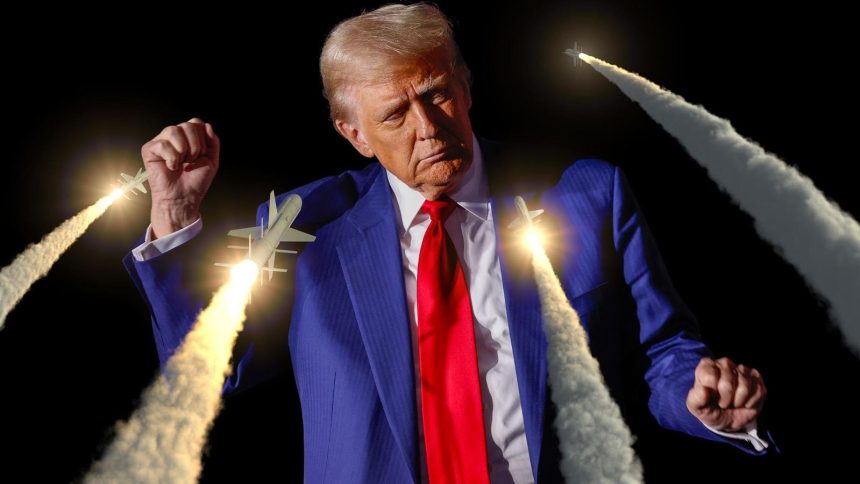The resurgence of American manufacturing is a rallying cry that resonated deeply during Donald Trump’s presidential campaigns. Now, a newly formed coalition, the New American Industrial Alliance (NAIA), composed of Silicon Valley heavyweights, seeks to translate this vision into reality. Backed by prominent venture capital firms like General Catalyst, 8VC, and Palantir, along with startups like Oklo and Joby Aviation, the NAIA aims to become the leading voice for tech companies investing in key industrial sectors crucial to America’s manufacturing revival: weapons, space, and nuclear power. Their objective is to influence policy and legislation, advocating for deregulation and increased government support for fledgling manufacturing businesses. The NAIA’s scope encompasses a broad spectrum of activities, from research and development to supply chain management, driven by the belief that a confluence of capital, innovation, and favorable policies is essential for transforming physical industries.
The NAIA anticipates a receptive environment within the incoming Trump administration, believing their priorities align with Trump’s proposed economic policies, including tariffs and cost-cutting measures. Bolstering this optimism is the involvement of several former Trump administration officials advising the NAIA, some of whom maintain close ties to the new administration. These advisors include Nadia Schadlow, formerly of the National Security Council, and Chris Buskirk, co-founder of the conservative donor group Rockbridge Network. Buskirk, whose investment firm 1789 Capital recently hired Donald Trump Jr., emphasizes the need for technological innovation within manufacturing and anticipates policies conducive to an “American renaissance.” Schadlow echoes this sentiment, hoping that regulatory reforms will spur increased production at lower costs. While the NAIA claims bipartisanship, citing interest from both sides of the aisle in bolstering domestic manufacturing and supply chain sovereignty, it has yet to disclose any advisors from the Biden administration.
The NAIA has secured seven-figure funding from its members, who pay varying membership fees. Notably absent from the current roster are SpaceX, Anduril, and Andreessen Horowitz. Y Combinator, an incubator that recently launched its first weapons company, has joined to advocate for procurement reforms and increased competition, seeing a ripe opportunity under the new administration. The NAIA’s emergence coincides with a surge in venture capital investment in military weapons, aerospace, and nuclear energy, driven by global conflicts and intensifying competition with China. Palantir’s CTO, Shyam Sankar, an advisor to the NAIA, emphasizes the necessity of reindustrialization for national security and deterrence, highlighting the significant influx of capital into this space.
The NAIA plans to focus its policy recommendations on several key areas, including the Pentagon budget, semiconductor legislation like the CHIPS Act, and nuclear energy legislation like the Advance Act. They will advocate for tax incentives, streamlined permitting processes, and even environmental review exemptions for manufacturing facilities. The group cites the consolidation of defense companies in the 1990s, which resulted in a few dominant contractors, as a prime example of what needs to change. This consolidation, they argue, stifled competition and innovation. They aim to restore America’s former prowess in mass production, which they believe has been eroded by globalization and the rise of China. Joshua Steinman, a former National Security Council staffer who advised Trump on supply chain policy and now advises the NAIA, anticipates an aggressive “America First” economic policy approach. He notes the absence of an organization solely dedicated to advancing policies for industrial growth during his time in the Trump administration.
Led by Austin Bishop, an investor at Tamarack Global, the NAIA’s leadership also includes Julius Krein, founder of the journal American Affairs, and CEOs of manufacturing startups, Chris Power of Hadrian and Aaron Slodov of Atomic Industries. The genesis of the NAIA stemmed from the sold-out “Reindustrialize” conference held in Detroit, where leaders from Silicon Valley and industrial companies pledged to advocate for policies that would revitalize American manufacturing. This conference serves as a key platform for advancing the NAIA’s agenda, fostering membership engagement, and disseminating its goals. A second conference is planned for 2025, with several cities vying to host the event. The NAIA perceives a critical four-year window of opportunity to address the perceived crisis in American manufacturing, counter China’s influence, and restore the nation’s position as a domestic superpower.
The NAIA’s formation represents a significant convergence of interests between Silicon Valley’s technological prowess and the political imperative to revitalize American manufacturing. Their strategy hinges on leveraging policy and investment to foster innovation and growth in key industrial sectors. The alliance’s success will depend on navigating the complex interplay of political, economic, and technological forces, and their ability to effectively translate their vision into concrete policy changes. Their ambition is not merely to restore America’s manufacturing base, but to reimagine it for a new era of global competition, emphasizing technological innovation and strategic positioning in critical industries. Whether they can achieve these ambitious goals remains to be seen, but their emergence signals a potentially transformative shift in the landscape of American industrial policy. The coming years will be crucial in determining the impact of this alliance on the future of American manufacturing and its role in the global economy.



